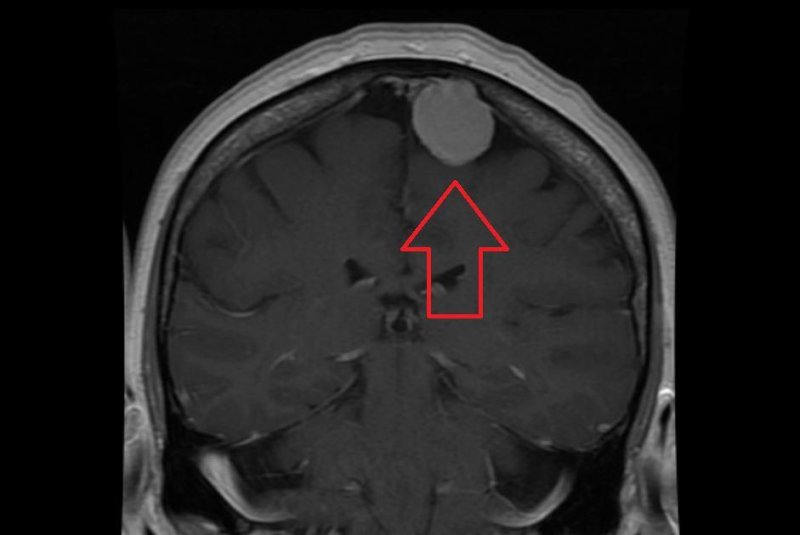Aggressive meningiomas are tumors that grow from the layer of tissue that surrounds the brain and spinal cord. Researchers at the University of California San Freancisco have linked a single gene to the aggressive form of brain cancer. Photo by Dr. James Heilman/
Wikimedia Commons
March 28 (UPI) -- A single gene has been linked to an aggressive form of brain cancer, potentially paving the way for new therapies to treat the disease, according to research.
Researchers at the University of California San Francisco studied aggressive meningiomas, which are tumors that grow from the layer of tissue that surrounds the brain and spinal cord. A new study, published Tuesday in Cell Reports, found that increased activity of a gene, known as FOXM1, appears to be responsible for these tumors' aggressive growth and frequent recurrence.
Meningiomas, the most common tumor found in the central nervous system, often are benign and grow slowly over time, but in 20 percent of the cases they are aggressive and can recur even after surgery and radiation therapy. Symptoms of the tumors can include headaches, seizures and neurological deficits, and they can lead to death.
Most of the tumors are treatable with radiation therapy or surgery, but there is no successful treatment or therapy for the more aggressive ones.
"Aggressive meningiomas are very insidious tumors. They keep coming back year after year. Sometimes, patients get worn down from the treatments, or become so old they can't tolerate them anymore," Dr. David Raleigh, a member of the UCSF Helen Diller Family Comprehensive Cancer Center, said in a press release. "Often, we run out of time, but with our new molecular insights into meningioma biology we may be able to find new cures for these tumors with fewer side effects and better outcomes."
Raleigh's group examined 280 human meningioma samples collected by the Department of Neurological Surgery at UCSF between 1990 and 2015. Their techniques included RNA sequencing and targeted gene expression profiling.
They found FOXM1 was responsible for aggressive meningioma growth. In previous studies, FOXM1 was linked to regulating the activity of many other genes, including cancer of liver, breast, lung, prostate, colon and pancreas.
The researchers found that heightened FOXM1 activity was the same in men and women, in older and younger patients, and in meningiomas coming from different parts of the brain. They even found the gene was an important driver of tumor recurrence after treatment.
In addition, researchers found Wnt, an intercellular signaling pathway involved with embryonic development and tissue formation, may also play a role with FOXM1 in the aggressive growth of meningioma.
Raleigh hopes a new treatment will be a good alternative to cranial surgeries or recurrent radiation therapies, especially in older patients who have more trouble tolerating them.
"There haven't been as many studies on what drives 'problem' meningiomas," Raleigh said. "For clinicians, patients, and families, these are the most heartbreaking cases because we expect to cure meningiomas, but sometimes we can't and we don't always do a good job of differentiating 'good' and 'bad' meningiomas ahead of time."















